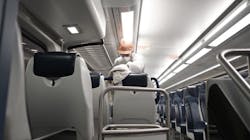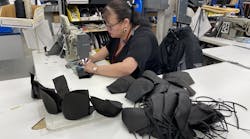Gov. Murphy signs executive order mandating face masks on NJ Transit and limiting number of riders
New Jersey Gov. Phil Murphy signed Executive Order No. 125 on April 11 that will require both riders and transit workers to wear cloth face coverings when on New Jersey Transit (NJ Transit) buses and trains and limits number of riders a vehicle can carry at one time, among other edicts meant to protect riders and workers from the possible spread of COVID-19.
As of Sunday, April 12, the state had 61,850 confirmed cases of novel coronavirus, which includes 2,350 deaths from the virus.
“We must continue our commitment to do everything we can to flatten the curve and defeat this virus,” said Gov. Murphy. “With these additional requirements, we are aggressively reducing the spread of the virus to protect New Jersey residents.”
The executive order goes into effect at 8:00 p.m. on April 13 and requires NJ Transit and private carriers contracted with the agency to provide workers with cloth face coverings, limit the number of passengers to 50 percent of stated vehicle capacity to encourage social distancing, board buses through the back door when possible, as well as provide drivers with added social distance by removing seats at the front of vehicles when possible.
NJ Transit says it has provided more than 604,000 gloves and 162,000 masks to employees for use on the job since March 1, 2020 and has been encouraging customers to wear masks since the Centers for Disease Control adjusted its guidance last week to recommend that everyone wear a face covering in situations where social distancing could be difficult.
Additionally, the executive order calls for the implementation of contactless pay options across all modes of transportation where feasible, continued sanitization of high touch areas and signage communicating and encouraging six feet of separation between people.
NJ Transit says it continues to disinfect vehicles every 24 hours with hard surface cleaning and disinfecting including handholds, arm rests, seating areas and restrooms. Station disinfecting efforts take place once every shift at major stations and terminals and includes ticket vending machines, handrails, door handles. Areas regularly cleaned include are doors, doorknobs, windows, benches, partitions, trash cans, elevators, escalators, handrails, ledges, all restrooms and floor surfaces and all floor mats.
“We are grateful Gov. Murphy is adding extra authority and enforcement to the personal protective equipment policies NJ Transit has implemented in recent weeks for the protection of our employees and customers,” said NJ Transit President and CEO Kevin Corbett. “Our bus, train, light rail and Access Link paratransit service is vital to ensuring essential personnel can continue to get to their jobs and back home again, and Gov. Murphy’s executive order strengthens the tools we have to do this as safely as possible during the COVID-19 pandemic.”

Mischa Wanek-Libman | Group Editorial Director
Mischa Wanek-Libman is director of communications with Transdev North America. She has more than 20 years of experience working in the transportation industry covering construction projects, engineering challenges, transit and rail operations and best practices.
Wanek-Libman has held top editorial positions at freight rail and public transportation business-to-business publications including as editor-in-chief and editorial director of Mass Transit from 2018-2024. She has been recognized for editorial excellence through her individual work, as well as for collaborative content.
She is an active member of the American Public Transportation Association's Marketing and Communications Committee and served 14 years as a Board Observer on the National Railroad Construction and Maintenance Association (NRC) Board of Directors.
She is a graduate of Drake University in Des Moines, Iowa, where she earned a Bachelor of Arts degree in Journalism and Mass Communication.


